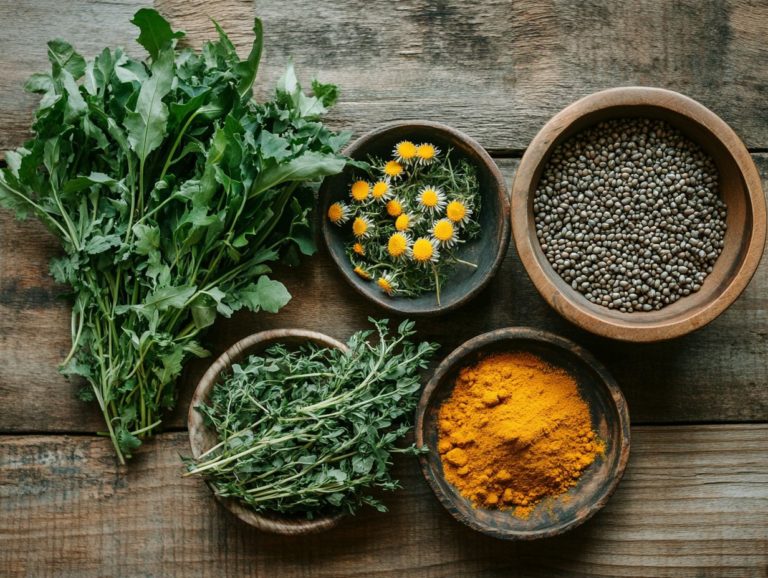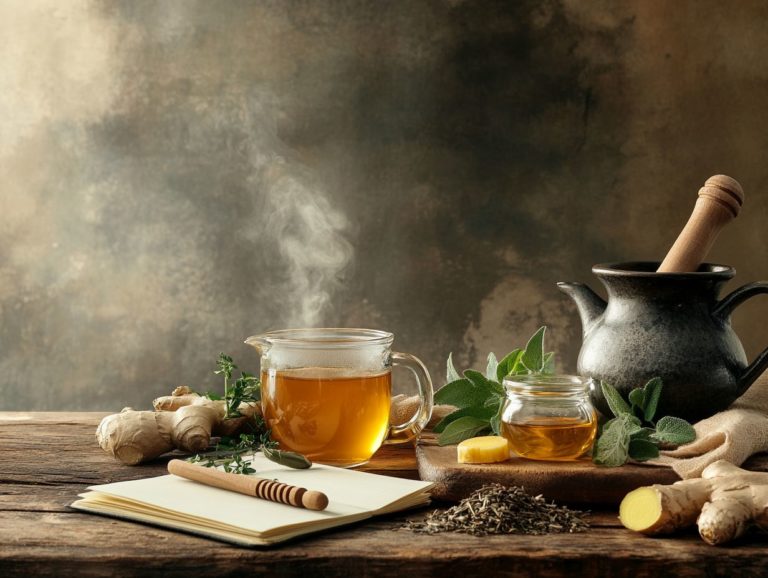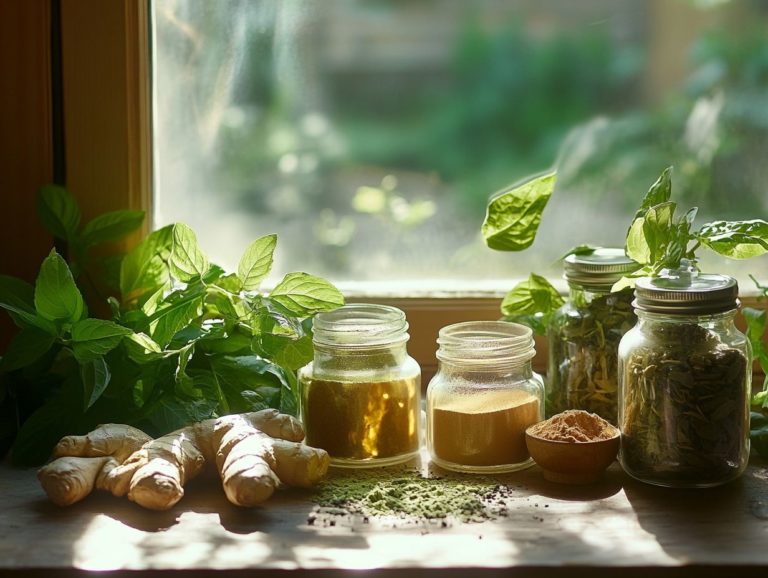How to Safely Use Herbal Remedies
Herbal remedies have long stood as a cornerstone of traditional medicine, offering natural options for many health issues. As interest in holistic healing flourishes, more individuals are turning to these time-honored solutions.
This article serves as your guide to understanding herbal remedies, their benefits, safety considerations, and best practices for selecting and using them effectively. You’ll also discover popular remedies and their specific applications.
Whether you’re a seasoned herbalist or simply curious about herbal healing, prepare to uncover valuable insights ahead!
Contents
- Key Takeaways:
- Discover the Power of Herbal Remedies!
- Benefits of Using Herbal Remedies
- Safety Considerations for Herbal Remedies
- How to Choose and Use Herbal Remedies Safely
- Common Herbal Remedies and Their Uses
- Frequently Asked Questions
- Can anyone safely use herbal remedies?
- How can I determine if an herbal remedy is safe to use?
- What are some common side effects of using herbal remedies?
- Are there safety concerns with using multiple herbal remedies at once?
- How can I ensure the quality of herbal remedies?
- What should I do if I experience any adverse reactions from using herbal remedies?
Key Takeaways:

Always research and evaluate herbal remedies before use to ensure their safety and effectiveness. Be aware of potential interactions and side effects, and consult with a healthcare professional if necessary. Remember that herbal remedies are not regulated like prescription medications, so caution and critical thinking are essential.
Discover the Power of Herbal Remedies!
Understanding herbal remedies invites you to delve into a rich tapestry of history and diverse applications. Derived from plants known for their active ingredients, these remedies play a significant role in natural healing and supporting various health conditions.
Cultures worldwide have embraced these remedies for centuries, viewing them as both alternatives and complements to conventional medicine. While many tout extensive benefits, it’s essential to approach them with thoughtful caution.
Adhering to quality standards and regulations, such as traditional herbal registration, enhances safety and bolsters evidence of effectiveness.
What are Herbal Remedies?
Herbal remedies are natural products that harness active ingredients extracted from various plant parts like leaves, roots, and flowers to support your health and wellness journey.
These remedies have stood the test of time, employed across diverse cultures for centuries, showcasing their integral role in traditional medicine systems globally.
From the ancient Ayurvedic practices of India to the rich herbal traditions of Native Americans, the variety of herbal preparations including soothing teas, potent tinctures, healing salves, and convenient capsules highlights their remarkable versatility.
Practitioners of herbal medicine often possess extensive knowledge about plant properties and therapeutic uses, guiding you in selecting the right remedies for your specific ailments.
As society increasingly turns to natural healing options, integrating these treatments into modern healthcare reflects a broader shift toward holistic well-being.
Benefits of Using Herbal Remedies
Herbal remedies present an array of potential health benefits, from boosting your immune system to aiding in the management of various health conditions.
This is largely due to their active ingredients, derived from plants long revered for their therapeutic properties.
Natural Healing and Potential Health Benefits

Natural healing through herbal treatments offers a compelling way to address various health conditions, promoting overall wellness and enhancing your immune system’s function.
Herbal remedies like echinacea are well-regarded for immune-boosting properties, potentially shortening colds and respiratory infections. Making a habit of consuming echinacea, especially during colder months, can significantly strengthen your body s defenses.
Turmeric is known for its strong anti-inflammatory properties and has earned acclaim for supporting joint health and mitigating chronic inflammation. Whether you incorporate it into meals or opt for it as a supplement, turmeric can deliver substantial benefits, especially for those experiencing arthritis or discomfort.
As you dive into these amazing options, consulting healthcare professionals for personalized recommendations is wise. This ensures you can safely and effectively harness the power of these natural treatments.
Safety Considerations for Herbal Remedies
Safety should be your top priority as you explore the world of herbal remedies.
This means thoroughly understanding potential issues, side effects, and adverse reactions that may arise, especially for people who may need extra care, like pregnant women.
Your awareness and caution can make all the difference in ensuring a safe and beneficial experience.
Possible Interactions and Side Effects
Possible interactions and side effects can arise when you combine herbal remedies with prescription or over-the-counter medications, leading to unforeseen health risks.
Take St. John s Wort, for example. While it s often sought after for its antidepressant benefits, it can significantly diminish the effectiveness of various medications, including those for heart conditions and birth control, putting you at potential risk.
Then there s Ginkgo biloba, a popular choice for boosting cognitive function and circulation. However, it may increase bleeding risk, particularly for those on anticoagulants, which are medications that help prevent blood clots, like warfarin.
To navigate these remedies safely, consulting healthcare professionals is essential. Make sure to disclose all supplements and medications you re taking to sidestep dangerous interactions and ensure that your approach is tailored to your unique health needs.
How to Choose and Use Herbal Remedies Safely
Choosing and using herbal remedies safely demands your careful attention to several key factors.
You should consider the quality of the herbal medicine products, seek out reputable sources for your purchases, and adhere to established guidelines for safe usage.
Researching and Evaluating Products

Researching and evaluating herbal remedies is essential for ensuring both efficacy and safety. You need to be well-informed about the quality standards and safety practices linked to these herbal products.
To successfully navigate this intricate landscape, seek out clinical studies that offer evidence-based insights into the effectiveness of specific herbal treatments.
Look for certifications from trusted organizations to ensure quality. Delving into user reviews is equally important, as they often unveil real-world experiences with the remedies.
Safety awareness is crucial; being informed enables you to identify potentially harmful ingredients or misleading claims. By combining these approaches, you can make more educated decisions about herbal medicine and minimize the risks associated with unverified products.
Common Herbal Remedies and Their Uses
Common herbal remedies include a diverse range of treatments that have been historically utilized to address various health conditions.
Each remedy presents its own unique properties and benefits, thanks to the distinct active ingredients it contains.
Overview of Popular Remedies and Their Purposes
An exploration of popular herbal remedies reveals a fascinating array of purposes, from St. John’s Wort, which supports mood, to ginger, known for its digestive health benefits. Each remedy boasts a rich history and evidence of effectiveness.
The use of these botanicals isn’t merely a passing trend; many trace their origins back thousands of years, having been employed by ancient civilizations for their remarkable healing properties.
For instance, ashwagandha holds a revered place in Ayurvedic medicine, celebrated for its ability to alleviate stress and boost vitality. Meanwhile, turmeric has been a staple in traditional Chinese medicine, renowned for its anti-inflammatory effects.
Recent scientific studies have started to validate these age-old claims, creating a bridge between time-honored wisdom and contemporary healing practices. By diving into the historical contexts and potential benefits of these herbal treatments, you may discover effective alternatives to conventional therapies.
Frequently Asked Questions
Can anyone safely use herbal remedies?

No, it is important to consult with a healthcare professional before using herbal remedies, especially if you have pre-existing health conditions or are taking any medications.
Talk to your healthcare provider today to make sure herbal remedies are right for you!
How can I determine if an herbal remedy is safe to use?
Start by doing your research. Check for possible interactions with medications or health conditions.
Look for trustworthy sources. Always consult a healthcare professional for advice.
What are some common side effects of using herbal remedies?
Common side effects include nausea, upset stomach, and dizziness.
If these symptoms persist or get worse, stop using the remedy and consult a doctor.
Are there safety concerns with using multiple herbal remedies at once?
Yes, using multiple remedies can increase the risk of interactions and side effects.
Always talk to a healthcare professional before combining herbal products.
How can I ensure the quality of herbal remedies?
Choose products that have been tested and certified by third parties for quality and purity.
Always read and follow any warning labels or instructions on the packaging.
What should I do if I experience any adverse reactions from using herbal remedies?
If you experience adverse reactions, stop using the remedy right away.
Seek medical attention if needed and report your reaction to both your healthcare provider and the product manufacturer.






